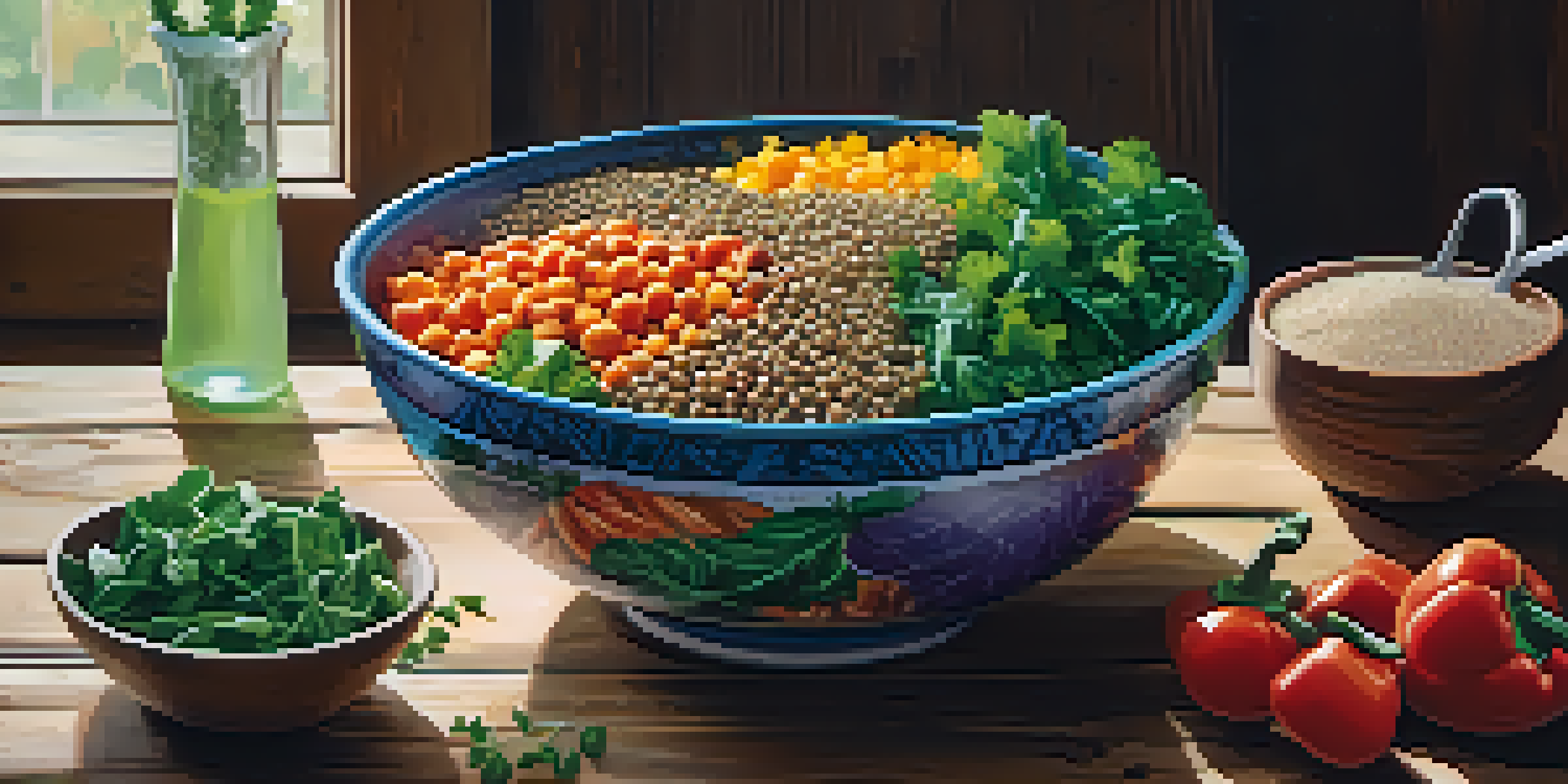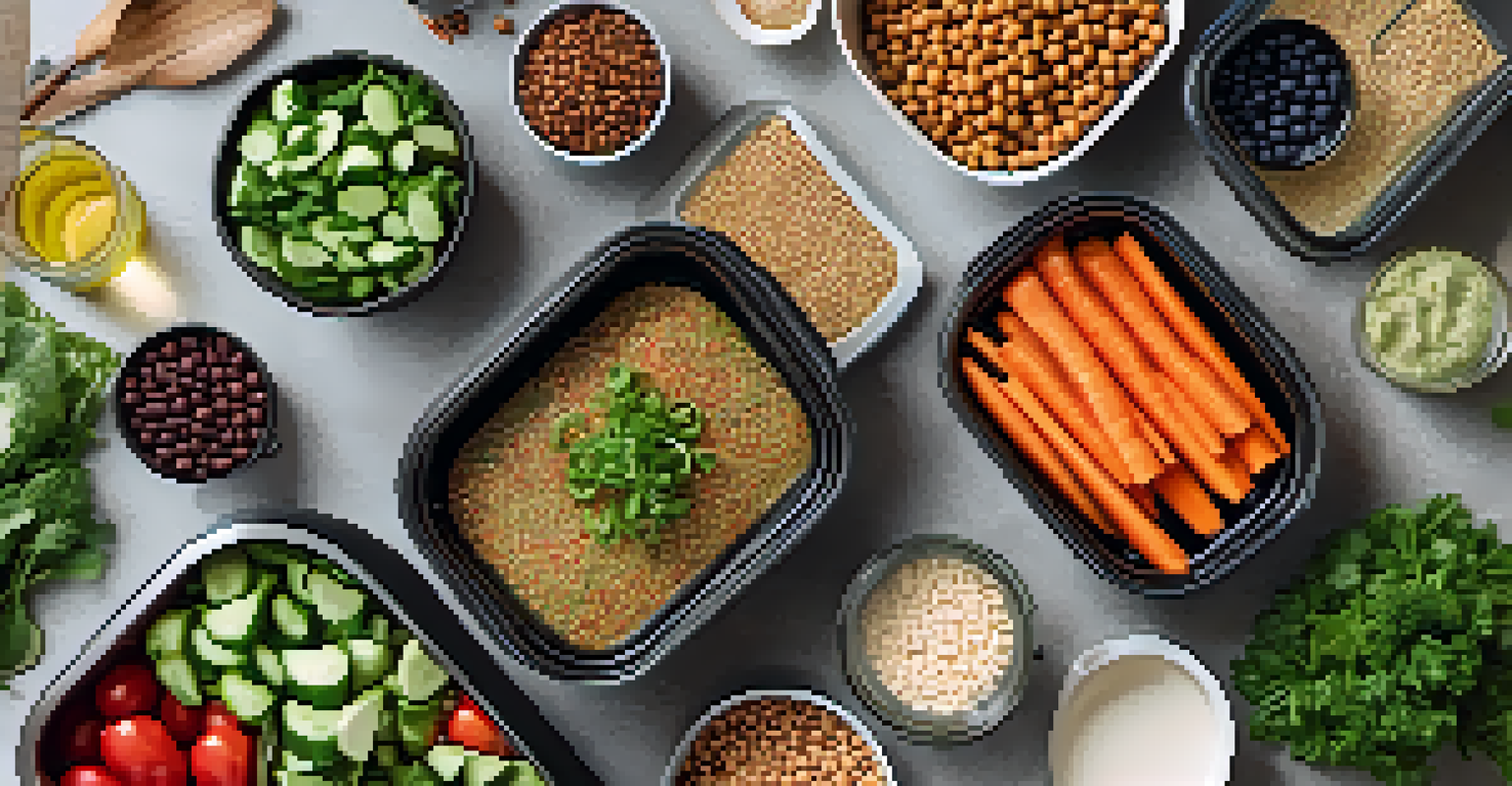Plant-Based Diets: Are They Suitable for Martial Artists?

Understanding Plant-Based Diets: What Are They?
A plant-based diet focuses primarily on foods derived from plants. This includes fruits, vegetables, grains, nuts, and seeds, while limiting or excluding animal products. Many people adopt this lifestyle for various reasons, such as health, environmental concerns, or ethical beliefs.
Let food be thy medicine and medicine be thy food.
It's important to note that 'plant-based' doesn't always mean 'vegan.' Some people may still consume small amounts of animal products occasionally. The flexibility in this diet can cater to different preferences and nutritional needs.
For martial artists, understanding the components of a plant-based diet is crucial. By learning how to effectively incorporate these foods, athletes can ensure they receive adequate nutrition to support their training and performance.
The Nutritional Needs of Martial Artists
Martial artists require a balanced diet rich in carbohydrates, proteins, fats, vitamins, and minerals to perform at their best. Carbohydrates provide the energy needed for vigorous training sessions, while proteins are essential for muscle repair and recovery. Healthy fats also play a role in sustained energy and overall health.

While it may seem challenging to meet these nutritional needs on a plant-based diet, it is entirely possible with careful planning. Foods such as quinoa, lentils, chickpeas, nuts, and seeds are excellent sources of protein and can easily be integrated into meals.
Benefits of Plant-Based Diets
Adopting a plant-based diet can enhance energy levels, recovery, and overall health for martial artists.
Additionally, incorporating a variety of fruits and vegetables ensures that martial artists receive vital vitamins and minerals, supporting their immune system and overall well-being.
Benefits of Plant-Based Diets for Martial Artists
Adopting a plant-based diet can offer numerous benefits for martial artists, including improved energy levels, enhanced recovery, and better overall health. Many athletes report feeling lighter and more agile after switching to plant-based foods, which can be advantageous in martial arts.
The food you eat can be either the safest and most powerful form of medicine or the slowest form of poison.
Plant-based diets are also associated with reduced inflammation, which is crucial for recovery after intense training sessions. Foods rich in antioxidants, such as berries and leafy greens, can help combat inflammation and promote healing.
Lastly, a plant-based diet can lead to better weight management without sacrificing performance. This can be especially beneficial for martial artists who need to maintain a specific weight class.
Challenges of Plant-Based Diets for Martial Artists
While there are many benefits to a plant-based diet, martial artists may face some challenges. One common concern is ensuring adequate protein intake, as many traditional protein sources are animal-based. However, with careful planning and knowledge of plant protein sources, this can be overcome.
Another challenge is meal preparation and planning. Athletes often have busy schedules, making it difficult to prepare healthy meals consistently. Planning meals in advance and having quick, nutritious options on hand can help mitigate this issue.
Nutritional Needs for Athletes
Martial artists need a balanced intake of carbohydrates, proteins, and healthy fats, which can be met with plant-based foods.
Lastly, some martial artists may experience social pressure or skepticism from peers regarding their dietary choices. Educating oneself and being confident in the benefits of a plant-based diet can help navigate these conversations.
Examples of Plant-Based Foods for Martial Artists
There is a wide variety of plant-based foods that can fuel martial artists effectively. For example, foods like lentils, tempeh, and chickpeas are excellent protein sources that can be used in various dishes. Whole grains like brown rice and quinoa also provide necessary carbohydrates for energy.
Incorporating a diverse range of fruits and vegetables not only adds flavor but also ensures a broad spectrum of nutrients. Leafy greens like spinach and kale are particularly beneficial due to their high vitamin and mineral content.
Snacks are also crucial for martial artists, and plant-based options like nuts, seeds, and energy bars made from dates or nut butter can provide quick energy boosts between training sessions.
Tips for Transitioning to a Plant-Based Diet
Transitioning to a plant-based diet doesn't have to be overwhelming. Start by gradually incorporating more plant-based meals into your diet. For example, try having a meatless Monday or swapping out one animal-based meal per week with a plant-based alternative.
Experimenting with new recipes can also make the transition enjoyable. There are countless delicious plant-based recipes available online that can inspire creativity in the kitchen and make healthy eating exciting.
Challenges in Transitioning
While transitioning to a plant-based diet, martial artists may face protein intake concerns and social pressures.
Lastly, it’s essential to listen to your body during this transition. Monitor how you feel after meals, adjust your food choices as needed, and consult with a nutritionist if you have specific dietary concerns or questions.
Conclusion: Is a Plant-Based Diet Right for You?
Ultimately, whether a plant-based diet is suitable for martial artists depends on individual preferences, training goals, and nutritional requirements. Many athletes thrive on plant-based diets, experiencing improved energy levels and recovery.
It’s crucial to approach the diet mindfully, ensuring that all nutritional needs are met through careful planning and a variety of food choices. Engaging with a nutritionist can help tailor the diet to an athlete's specific needs.

In the end, the best diet is one that supports your training, enhances your performance, and fits your lifestyle. Plant-based diets can be a viable option for martial artists willing to explore this nutritious lifestyle.